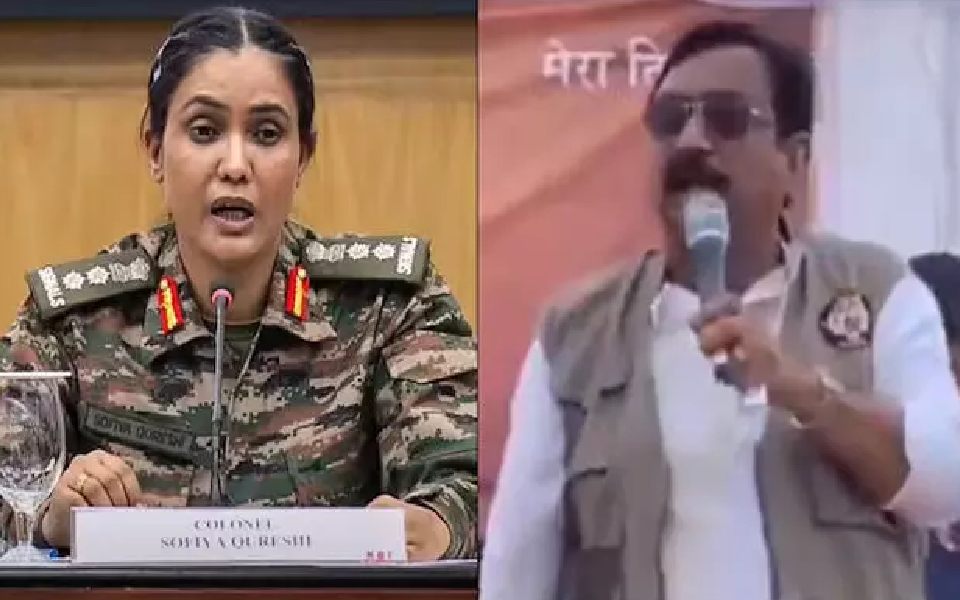Mumbai (PTI): In the wake of multiple incidents of Vande Bharat train colliding with cattle in Gujarat, the Railway Protection Force has started issuing notices to the heads of villages located along the route in Maharashtra's Palghar, asking them not allow the animals roam unattended near the tracks, officials said on Friday.
The notices warned that if any cattle owner is found to be negligent, then legal action could be taken against him.
The semi-high speed express train service between the capital cities of Gujarat and Maharashtra was launched on September 30 by Prime Minister Narendra Modi. Since its inception, three incidents have taken place in Gujarat in which the train collided with cattle.
Talking to PTI, Western Railway chief spokesperson Sumit Thakur said notices are being issued by the Mumbai division of the RPF to the sarpanchs of the villages, in which the authorities have appealed to the local residents not to let their cattle loiter along the tracks so that such mishaps can be averted.
The notices issued to the sarpanchs are preventive in nature, Thakur said.
Last Saturday, the Mumbai-Gandhinagar Vande Bharat Superfast Express rammed into cattle near Atul station in Gujarat. It was the third such incident since the inception of the train service. Earlier, on October 6 and 7, the train had rammed into some cattle. Both the incidents had occurred in Gujarat. In all these incidents, the passengers were not hurt, although the train's front portion suffered damages.
"Such cattle run-over incidents adversely affected the rail operations. Such incidents increase the possibility of rail accidents and can even lead to derailment. They not only cause disruption of rail traffic and loss of property of the railways, but also pose danger to passengers," Thakur said.
In the notices issued to the sarpanchs, the RPF said that a large number of stray animals (cows and buffaloes) come on to the railway tracks and there is always a possibility that the train-cattle collision can lead to major accidents,
In the notices, the RPF has appealed to the sarpanchs to conduct an awareness campaign for villagers living near the railway tracks.
"Please catch the stray animals and send them to gaushalas (cow shelters) built by the administration or social organisations and also make the residents of the village aware of this in the gram sabha meetings," the notice read.
The notices further warned that if any animal owner is negligent, then it is an offense punishable under the Railways Act, legal action would be taken against him.
Thakur further said that for the prevention of such cases in future, the RPF's Mumbai division has identified various vulnerable locations. The RPF has carried out frequent awareness and sensitisation campaigns at all these locations.
"The RPF has conducted 1,023 awareness campaigns at vulnerable locations so far this year," Thakur said.
He further said that meetings are being conducted with sarpanchs of all villages located along the railway tracks and so far more than 50 meetings have been held this year to avoid the incidents of cattle hit.
Thakur further said that dumping of garbage along the railway tracks by the people is also a cause as this attracts the cattle to graze near the railway lands/tracks. The RPF is also working in close coordination with city the local administration and police to prevent the movement of stray cattle near railway tracks.
A press release issued by the WR last week said the railway authorities are taking strict action against the violators, whose cattle are found moving in the railway land.
As per the provisions of Railways Act 1989, owners of cattle are liable to be punished under section 154 (endangering safety of persons travelling by railway by wilful act or omission, punishable with imprisonment for 1 year, or with fine or both) and under section 147 (trespass and refusal to desist from trespass, punishable with imprisonment for 6 months, or fine Rs 1,000 or both), the release said.
Let the Truth be known. If you read VB and like VB, please be a VB Supporter and Help us deliver the Truth to one and all.
Bhopal/Indore, May 13 (PTI): Madhya Pradesh Minister and BJP leader Vijay Shah has sparked a major controversy with objectionable comments that appeared to be directed at Col Sofia Qureshi, whom he tried to project as a "sister of terrorists."
Under severe flak, Shah said if anyone is hurt by his statement, he is ready to apologise ten times, adding that he respects Colonel Qureshi more than his sister.
The Congress has appealed to Prime Minister Narendra Modi to sack Shah from the Madhya Pradesh cabinet.
Colonel Qureshi had conducted regular press briefings, sharing details of the 'Operation Sindoor' launched by Indian armed forces to strike terrorists, joined by Foreign Secretary Vikram Misri and Wing Commander Vyomika Singh.
"Those people (terrorists) who had wiped out the sindoor (vermilion) of our sisters (in the Pahalgam terror attack)..We avenged these 'kate-pite' people by sending their sister to destroy them," Shah said.
"They (terrorists) killed our Hindu brothers by making them remove their clothes. PM Modi ji responded by sending their (terrorists') sister in an Army plane to strike them in their houses. They (terrorists) made our sisters widows, so Modiji sent the sister of their community to strip them and teach them a lesson", the BJP leader said while addressing a gathering in Ramkunda village near Indore.
He said, "Revenge was taken for the honour of our country (India), respect, and for the (slain) husbands of our sisters by sending a sister from your (terrorists') community to Pakistan".
The tribal welfare minister clarified that his remarks should not be construed otherwise.
Shah's remarks drew wide-scale condemnation, with Congress demanding his immediate dismissal from the MP cabinet.
Congress President Mallikarjun Kharge said Shah, who made 'derogatory' remarks in reference to Colonel Sofia Qureshi, should be dismissed immediately.
"A minister of the BJP government of Madhya Pradesh has made a very derogatory, shameful and cheap remark about our brave daughter Colonel Sofia Qureshi. The terrorists of Pahalgam wanted to divide the country, but the country was united during the entire 'Operation Sindoor' to give a befitting reply to the terrorists," Kharge posted on X.
He alleged that the BJP-RSS harbours an anti-women mentality.
"First, the wife of the naval officer martyred in Pahalgam was trolled on social media, then the daughter of Foreign Secretary Vikram Misri was harassed, and now the BJP ministers are making such indecent comments about our brave woman Sophia Qureshi," Kharge said and appealed to PM Modi to immediately sack Shah.
Madhya Pradesh Congress president Jitu Patwari shared the video of Shah on X and asked whether the BJP agrees with the minister's "low thinking"?
The MP Congress Committee alleged that Shah's "indecent' and hate-filled" statement is not just a personal attack, but an open attack on India's military dignity, national unity, and women's honour.
Amid the raging controversy, the BJP's Madhya Pradesh general secretary Hitanand Sharma summoned Shah to the state headquarters in Bhopal.
According to sources, Sharma reprimanded the minister, who also met the state BJP president, Vishnu Dutt Sharma.
Speaking to reporters, Shah sought to attribute the intemperate remarks to his "disturbed" state of mind in view of the brutal killing of innocent people in Pahalgam by terrorists.
He claimed many members of his family have a military background and many were martyred.
"Sister Sophia has brought glory to India by rising above caste and religion. She is more respected than our own sister. I salute her for her service to the nation.
"We cannot even think of insulting her in our dreams. Still, if my words have hurt society and religion, then I am ready to apologise ten times,'' he added.
Meanwhile, Congress leader Manoj Shukla and the party workers blackened the nameplate of Shah at his bungalow and raised slogans seeking his resignation.
'हमारी सेना की जांबाज बेटियां आतंकवादियों की बहन हैं'
— Congress (@INCIndia) May 13, 2025
- ये घटिया बात मध्य प्रदेश में BJP सरकार के मंत्री विजय शाह ने कही है।
भारत की जिन बेटियों पर सबको नाज है, उन बेटियों को लेकर ये शर्मनाक बयान दिया गया है। उन्हें आतंकवादियों की बहन बताया गया है।
ये हमारी पराक्रमी सेना का… pic.twitter.com/y591M3ky8G





